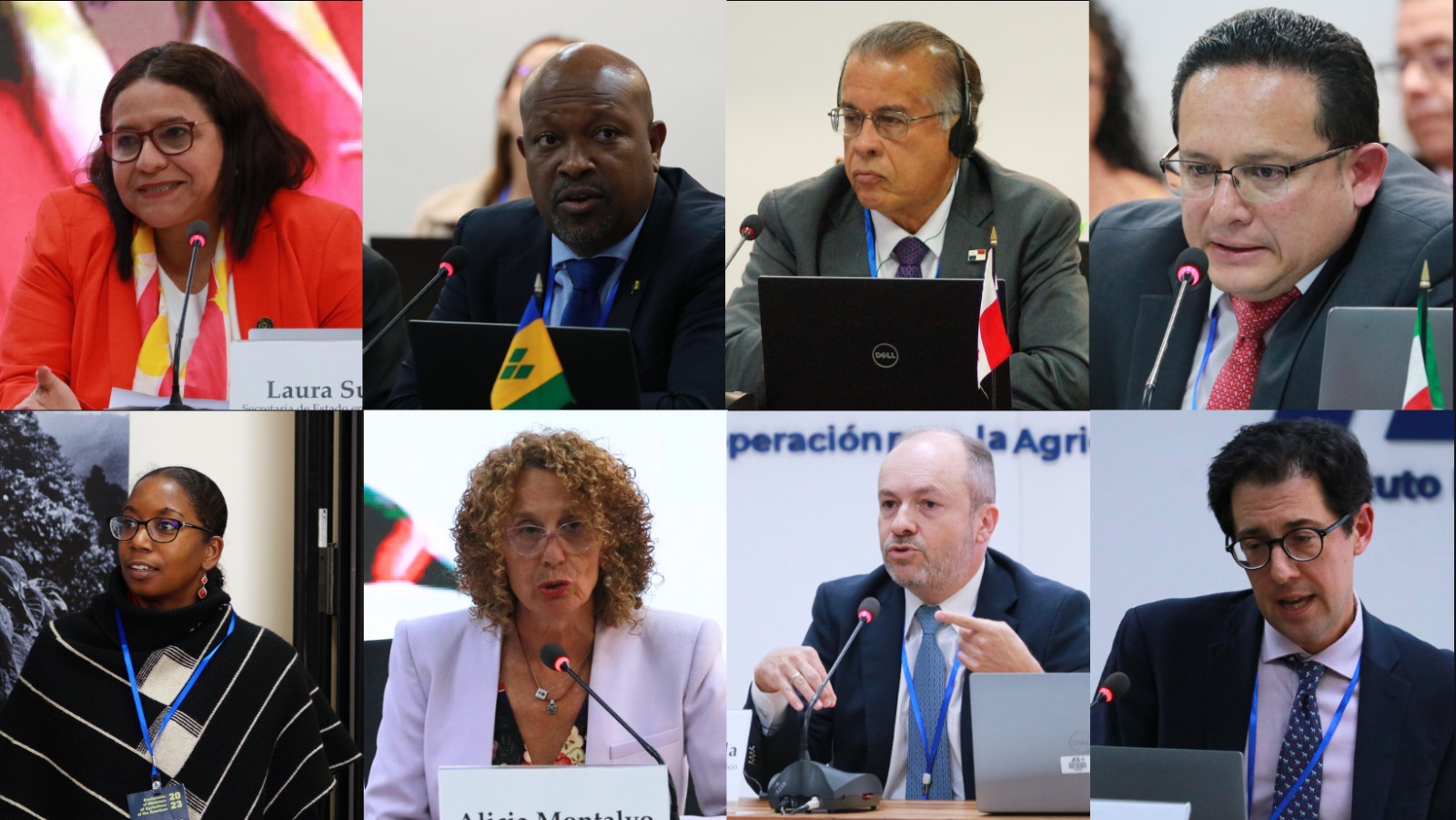Agriculture ministers of the Americas explained to representatives of IDB, CAF and the World Bank that support mechanisms are required for family farming, to incorporate advanced water management and soil regeneration practices, among others that foster sustainability.

San Jose, 6 October, 2023 (IICA). Considering asymmetries by country, creating necessary capacities in each nation to access funding, and defining credit beneficiaries are some of the needs identified by ministers of Agriculture of the Americas to harness resources from multilateral funding agencies and to strengthen agriculture, food security and regional sustainability in the face of climate change.
At a forum held during the Conference of Ministers of Agriculture of the Americas 2023 in Costa Rica, the agriculture authorities of the region’s countries put across their perspective to representatives of credit agencies on how international funding is essential for farmers, especially family farmers, to increase their climate resilience, incorporate best practices and be part of the efforts to conserve water and regenerate soils in the hemisphere.
The ministerial conference was organized by the Inter-American Institute for Cooperation on Agriculture (IICA). Financial entities were represented by experts from the Inter-American Development Bank (IDB), CAF-Development Bank of Latin America, and the World Bank.
At the Roundtable on Funding for Food Security and Sustainable Development, Laura Suazo, Secretary of Agriculture and Livestock of Honduras, said that “finance has been a central issue in all global talks, as the annual cost of meeting sustainable development goals and ensuring climate adaptation, resilience and mitigation is estimated at 3 to 4 trillion dollars”.
Keeley Holder, Chief Officer of the Ministry of Agriculture and Food and Nutrition Security of Barbados, noted the importance of considering inequity in each country’s food security issues when considering climate finance.
Along the same lines, Saboto Caesar, Minister of Agriculture of Saint Vincent and the Grenadines, said: “In many States we lack legal and human resources and the capacity to access funding to fight climate change. We must create a platform through which we can reach different people who can work with policy-builders and provide access to the most vulnerable sectors”.
Augusto Valderrama, Minister of Agricultural Development of Panama, said that conservation is essential to make it the maximum goal of climate finance. “We need wisdom and discernment so that governments and financial entities do not lose the human species and continue advancing”, he said.
Santiago Argüello, General Coordinator of the Secretariat of Agriculture and Rural Development of Mexico, stressed the importance of “designing finance mechanisms for intermediaries, which make it possible to obtain credit, make it accessible and form creditworthy individuals. I think this is the big problem in family farming, that in the southeast of Mexico only 10 percent have access to credit”.
Vision of finance by agency
Alicia Montalvo, CAF Manager of Climate Action and Positive Biodiversity, highlighted the importance of food security in Latin America and its connection to climate change.
“CAF’s strategy is based on two pillars: first, tackling poverty, which means food security, we want sustainable and inclusive growth; and the second pillar is that agricultural development should occur with all the necessary conditions of environmental sustainability. The goal is to offer the necessary prosperity and best living conditions to all those involved in food value chains”, Montalvo said.
She added that CAF seeks to invest in food systems through technological improvements, training, climate resilience, and agriculture and biodiversity.
Juan Pablo Bonilla, IDB Manager of Climate Change and Sustainable Development, explained that the IDB proposes mechanisms such as debt-for-nature swaps, issuing thematic bonds at lower costs, and the IDB CLIMA financial tool, which offers discounts on eligible loans when specific biodiversity and climate goals are reached and verified.
Bonilla said, “We are the first development bank that, with its own capital, is going to have a facility for the payment of results in credit operations in the next five years; we have even included the hurricane clause, making us the first bank to include such a clause, and we are starting it in various Caribbean countries, so that if a hurricane comes, the main payment can be postponed for two years”.
David Treguer, the leader of the World Bank’s Sustainable Development Program, Central America and the Dominican Republic, underlined the success of results-based programs applied in Morocco that go beyond agriculture and connect agroindustry, green jobs, innovation and digital agriculture.
“At the World Bank we not only propose projects and loans, there are also consultancy services, repayable or not, depending on the country, and we have different types of projects, we have the typical investment project, we have budgetary support, and a results-based program, and here there is a very big possibility of making innovations in terms that include the sector in the general economy”, Treguer said.
More information:
Institutional Communication Division.
comunicacion.institucional@iica.int











